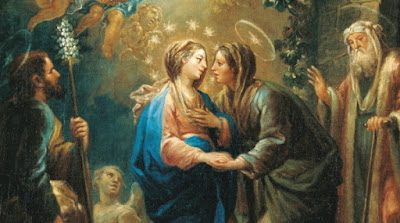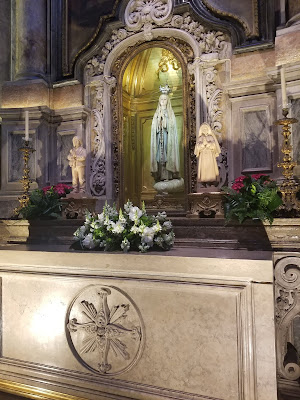Commemoration (1954 Calendar): July 25
BLESSING OF AN AUTOMOBILE OR OTHER VEHICLE
P: Our help is in the name of the Lord. All: Who made heaven and earth. P: The Lord be with you. All: May He also be with you.
Let us pray. Lord God, be well disposed to our prayers, and bless + this vehicle with your holy hand. Appoint your holy angels as an escort over it, who will always shield its passengers and keep them safe from accidents. And as once by your deacon, Philip, you bestowed faith and grace upon the Ethiopian seated in his carriage and reading Holy Writ, so also now show the way of salvation to your servants, in order that, strengthened by your grace and ever intent upon good works, they may attain, after all the successes and failures of this life, the certain happiness of everlasting life; through Christ our Lord. All: Amen.
It is sprinkled with holy water.
The following story of St. Christopher's life is taken from Catholic Tradition:
AN ANCIENT tradition concerning St. Christophorus relates: He was born in the land of Canaan, and was named Reprobus, that is Reprobate, for he was a barbarous heathen. In stature and strength he was a giant. Thinking no one his like in bodily vigor, he resolved to go forth in search of the mightiest master and serve him. In his wanderings, he met with a king who was praised as the most valorous man on earth. To him he offered his services and was accepted. The king was proud of his giant and kept him near his person. One day a minstrel visited the king's castle, and among the ballads he sung before the court was one on the power of Satan. At the mention of this name the king blessed himself, making me Sign of the Cross. Reprobus, wondering, asked him why he did that. The king replied: "When I make this Sign, Satan has no power over me." Reprobus rejoined: "So thou fearest the power of Satan? Then he is mightier than thou, and I shall seek and serve him."
Setting forth to seek Satan, he came into a wilderness. One dark night he met a band of wild fellows riding through the forest. It was Satan and his escort. Reprobus bravely accosted him, saying he wished to serve him. He was accepted. But soon he was convinced that his new master was not the mightiest on earth. For one day, whilst approaching a Crucifix by the wayside, Satan quickly took to flight, and Reprobus asked him for the reason. Satan replied: "That is the image of my greatest enemy, Who conquered me on the Cross. From Him I always flee." When Reprobus heard this, he left the devil, and went in search of Christ.
In his wanderings, he one day came to a hut hidden in the forest. At its door sat a venerable old man. Reprobus addressed him, and in the course of the conversation that ensued the old man told him that he was a hermit, and had left the world to serve Christ, the Lord of Heaven and earth. "Thou art my man," cried Reprobus; "Christ is He Whom I seek, for He is the strongest and the mightiest. Tell me where I can find Him."
The hermit then began instructing the giant about God and the Redeemer, and concluded by saying: "He who would serve Christ must offer himself entirely to Him, and do and suffer everything for His sake. His reward for this will be immense and will last forever." Reprobus now asked the hermit to allow him to remain, and to continue to instruct him. The hermit consented. When Reprobus was fully instructed, he Baptized him. After his Baptism, a great change came over the giant. No longer proud of his great size and strength, he became meek and humble, and asked the hermit to assign to him some task by which he might serve God, his master. "For," said he, "I can not pray and fast; therefore I must serve God in some other way." The hermit led him to a broad and swift river nearby, and said: "Here build thyself a hut, and when wanderers wish to cross the river, carry them over for the love of Christ." For there was no bridge across the river.
Henceforth, day and night, whenever he was called, Reprobus faithfully performed the task assigned to him. One night he heard a Child calling to be carried across the river. Quickly he rose, placed the Child on his stout shoulder, took his staff and walked into the mighty current.
Arrived in midstream, the water rose higher and higher, and the child became heavier and heavier. "O child," he cried, "how heavy thou art! It seems I bear the weight of the world on my shoulder." And the Child replied, "Right thou art. Thou bearet not only the world, but the Creator of Heaven and earth. I am Jesus Christ, thy King and Lord, and henceforth thou shalt be called Christophorus, that is, Christ-bearer. Arrived on yonder shore, plant thy staff in the ground, and in token of My power and might tomorrow it shall bear leaves and blossoms."
And the Child disappeared. On reaching the other shore, Christophorus stuck his staff into the ground, and behold, it budded forth leaves and blossoms. Then, kneeling, he promised the Lord to serve Him ever faithfully. He kept his promise, and thenceforth became a zealous preacher of the Gospel, converting many to the Faith. On his missionary peregrinations he came also to Lycia, where, after his first sermon, eighteen thousand heathens requested Baptism. When Emperor Decius heard of this, he sent a company of four hundred soldiers to capture Christophorus. To these he preached so convincingly, that they all asked for Baptism. Decius became enraged thereat and had him cast into prison. There he first treated him with great kindness, and surrounded him with every luxury to tempt him to sin, but in vain. Then he ordered him to be tortured in the most cruel manner, until he should deny the Faith. He was scourged, placed on plates of hot iron, boiling oil was poured over and fire was lighted under him. When all these torments did not accomplish their purpose, the soldiers were ordered to shoot him with arrows. This, too, having no effect, he was beheaded, on July 25, 254.
Two great Saints refer to the wonderful achievements of St. Christophorus. St. Ambrose mentions that this Saint converted forty-eight thousand souls to Christ. St. Vincent Ferrer declares that when the plague devastated Valencia, its destructive course was stayed through the intercession of St. Christophorus.
THE life of St. Christophorus conveys a wholesome truth. We ought all to be Christ-bearers, by preserving in our hearts faith, hope, and charity, and by receiving Our Lord worthily in Holy Communion. He alone is worthy of our service. In the service that we owe to men, we ought to serve God by doing His will. We can not divide our heart, for Our Lord Himself says, "No man can serve two masters" [Matt. 6: 24]. If you serve the world, it deceives you, for it can not give you what it promises. If you serve sin, Satan is your master. He, too, deceives his servants, and leads them to perdition. Christ on the Cross conquered these two tyrants, and with His help you can also vanquish them. Therefore, give yourself to Him with all your heart, and you shall find peace in this world, and eternal bliss in the next. St. Augustine learned this truth by sad experience, and therefore exclaims:
"Thou hast created us for Thee, O Lord, and our heart is restless till it rests in Thee."
Collect:
O Almighty God, grant that we who celebrate the birthday of Your blessed martyr Christopher, may be made stronger in our love of You through his intercession. Through our Lord . . .









































































